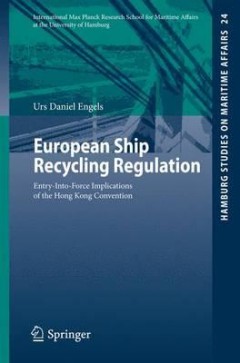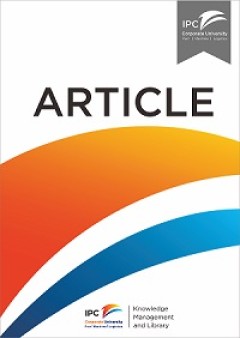Ditapis dengan

Fish for life
- Edisi
- 2004
- ISBN/ISSN
- -
- Deskripsi Fisik
- 130 p.
- Judul Seri
- -
- No. Panggil
- TXT GEN STE f C.1
- Edisi
- 2004
- ISBN/ISSN
- -
- Deskripsi Fisik
- 130 p.
- Judul Seri
- -
- No. Panggil
- TXT GEN STE f C.1

A special issue of abstracted articles on the management of distribution and …
This special “Anbar Abstracts” issue of the European Business Review is split into six sections covering abstracts under the following headings: Top management issues; Marketing and distribution; Personnel and training; Information management and technology; Operations and production management; Accounting and finance.
- Edisi
- Volume 23 · Number 4 · 1995 · p. 2
- ISBN/ISSN
- 0959-0552
- Deskripsi Fisik
- 33 p.
- Judul Seri
- International Journal of Retail & Distribution Management
- No. Panggil
- ATC LO FOJ a C.1

European Monetary Union: the need for a contingency strategy within the retai…
The decision on which countries will participate in European Monetary Union (EMU) is to take place as early as possible in 1998, with the final run-in, regarding the technicalities of introducing a single currency, starting on 1 January 1999. With this timetable in mind, examines some of the major issues which will have to be confronted by UK retailers. Even if the UK Government decides to opt…
- Edisi
- Volume 25 · Number 4 · 1997 · pp. 146–158
- ISBN/ISSN
- 0959-0552
- Deskripsi Fisik
- 15 p.
- Judul Seri
- International Journal of Retail & Distribution Management
- No. Panggil
- ATC MG ALE e C.1

Fundamental trade union rights and european constitution
“The new Eu ro pean Con sti tu tion re cog nises the func tion of the role of the so cial di a logue in the EU con text as a key el e ment of the Eu ro pean strat e gies. But the im pres sion is that the le gal out come con tained in the too so ber sen tences of the Eu ro pean Con sti tu tion is not co her ent with the role gained de facto by so cial part ners to day in the na tional mem bers…
- Edisi
- Volume 47 Number 6 2005
- ISBN/ISSN
- -
- Deskripsi Fisik
- 24 p.
- Judul Seri
- Managerial Law
- No. Panggil
- ATC MR VEN f

GREEN LOGISTICS STRATEGY FOR SOUTH EAST EUROPE: TO IMPROVE INTERMODALITY AND …
This article describes the trend towards European green initiatives in the transport sector. The introduction of green logistics management and green policy in Europe has been analysed to understand better the positive impact of green policy on environment, society and economy. With the most recent EU initiatives in the field of green logistics, intermodality has become the platform for green l…
- Edisi
- 2012 Volume 27(1): 25-33
- ISBN/ISSN
- 1648-3480
- Deskripsi Fisik
- 10 p.
- Judul Seri
- GREEN LOGISTICS STRATEGY FOR SOUTH EAST EUROPE
- No. Panggil
- ATC LO BES g

Consolidation and contestability in the European container handling industry
The FIrst part of this paper brings into discussion some recent changes in the dynamics of the European container handling business, in particular as a result of vertical and horizontal integration strategies of container terminal operators. The industry structure has become su ciently consolidated to raise a fundamental question about whether market forces are su cient to prevent the abuse…
- Edisi
- VOL. 29, NO. 3, 257±269
- ISBN/ISSN
- 1464±5254
- Deskripsi Fisik
- 15 p.
- Judul Seri
- Maritime Policy & Management: The flagship journal of international shipping and port research
- No. Panggil
- ATC LO NOT c

Significance of the European Fisheries fund in the development of fishery in …
Latvian ports are being developed as elements of a united transport logistics chain connecting the Baltic and other EU states, CIS states, Asia and America – they facilitate not only economic development of seaports and whole regions, but also the existence and development of fishery sector, wherewith the role of ports both in Latvia and in the EU continually increases. Technologically well-p…
- Edisi
- -
- ISBN/ISSN
- 1877-0428
- Deskripsi Fisik
- 9 p.
- Judul Seri
- Procedia - Social and Behavioral Sciences
- No. Panggil
- ATC PO ANE s

European ship recycling regulation : entry-into-force implications of Hong Ko…
- Edisi
- -
- ISBN/ISSN
- 978-3-642-35597-4
- Deskripsi Fisik
- xiv, 318
- Judul Seri
- -
- No. Panggil
- TXT MR ENG e
- Edisi
- -
- ISBN/ISSN
- 978-3-642-35597-4
- Deskripsi Fisik
- xiv, 318
- Judul Seri
- -
- No. Panggil
- TXT MR ENG e

The efficiency of European container terminals and implications for supply ch…
This paper investigates the efficiency of container terminals within the context of global supply chain management. The efficiency and scale properties of 104 of Europe’s container terminals with annual throughput of over 10,000 TEUs1 in 2003, distributed across 29 European countries, are derived using data envelopment analysis. The main findings are that significant inefficiency pervades mos…
- Edisi
- -
- ISBN/ISSN
- -
- Deskripsi Fisik
- 18 p.
- Judul Seri
- Maritime Economics & Logistics
- No. Panggil
- ATC LO CUL t

Preparation of logistics managers for the contemporary environment of the Eur…
- Edisi
- Vol. 31 Iss 7/8 pp. 487 - 505
- ISBN/ISSN
- -
- Deskripsi Fisik
- 20 p.
- Judul Seri
- -
- No. Panggil
- ATC LO SEM p
- Edisi
- Vol. 31 Iss 7/8 pp. 487 - 505
- ISBN/ISSN
- -
- Deskripsi Fisik
- 20 p.
- Judul Seri
- -
- No. Panggil
- ATC LO SEM p

European ports policy: meeting contemporary governance challenges
This article assesses how the European Union (EU) views the role of port authorities. It addresses the impact of EU law and EU policy on port governance models and, in particular, analyses whether the European Commission’s 2007 ports policy communication provides adequate instruments to meet contemporary governance challenges. For that purpose, an overview is first given of some of the main g…
- Edisi
- -
- ISBN/ISSN
- -
- Deskripsi Fisik
- 24 p.
- Judul Seri
- -
- No. Panggil
- ATC PO VER e

Online sustainability communication practices of European seaports
Although ports have a direct and substantial impact on the social and physical environments in which they operate, studies on corporate sustainability focussing on ports are scant. This study investigates the under-researched topic of sustainability communication practices in the European seaport sector. Its purpose is to analyse to what extent, if any, are there differences in these practices.…
- Edisi
- -
- ISBN/ISSN
- -
- Deskripsi Fisik
- 8 p.
- Judul Seri
- Journal of Cleaner Production
- No. Panggil
- ATC PO SAN o

Current practices in European ports on the awarding of seaport terminals to p…
The awarding of port services to private operators has become one of the most important tools for port authorities to retain some control on the organization and structure of the supply side of the terminal market. This paper discusses the awarding of terminals in European ports. The first part provides information on current practices of port authorities around Europe on tendering and contract…
- Edisi
- -
- ISBN/ISSN
- -
- Deskripsi Fisik
- 19 p.
- Judul Seri
- Maritime Policy & Management : The flagship journal of international shipping and port research
- No. Panggil
- ATC MR NOT c

Comparing port performance: Western European versus Eastern Asian ports
The purpose of this paper is to report a comparative investigation of port performance between Western Europe and Eastern Asia and develop a strategy to improve their port performance accordingly. Design/methodology/approach – A comprehensive literature review is conducted in order to identify factors for port performance evaluation. A large-scale questionnaire survey is employed in two port …
- Edisi
- Vol. 43 Iss 5/6
- ISBN/ISSN
- 0960-0035
- Deskripsi Fisik
- 25 p.
- Judul Seri
- International journal of physical distribution & logistics management
- No. Panggil
- ATC PO FEN c

Comparison of Asian and European Logistics Systems
- Edisi
- Vol. 33 Iss 1 pp
- ISBN/ISSN
- 0960-0035
- Deskripsi Fisik
- 26 p
- Judul Seri
- International Journal of Physical Distribution & Logistics Management
- No. Panggil
- ATC LO BOO c
- Edisi
- Vol. 33 Iss 1 pp
- ISBN/ISSN
- 0960-0035
- Deskripsi Fisik
- 26 p
- Judul Seri
- International Journal of Physical Distribution & Logistics Management
- No. Panggil
- ATC LO BOO c

The new European port policy proposals: Too much ado about nothing?
It is widely felt that in order to strengthen the competitiveness of European ports it is needed to ensure fair competition among ports and the sector is anew facing new and old challenges related to its long-term development.These challenges, and arguably the inability of the port sector and the European Union (EU) Member States to meaningfully react to them on their own, are at the basis …
- Edisi
- Vol. 17, 2, 127–141
- ISBN/ISSN
- -
- Deskripsi Fisik
- 15 pages
- Judul Seri
- -
- No. Panggil
- ATC PO HAR t

The efficiency of European container ports: a cross-sectional data envelopmen…
This paper focuses on measuring the efficiency of container terminals in Europe using the data envelopment analysis (DEA) approach. Container terminals in Europe play an important role in the region’s economic development and, as the result of their geographic concentration, face fierce competition compared with the rest of the world. Despite this, studies of the efficiency of container termi…
- Edisi
- 9
- ISBN/ISSN
- 1469-848X
- Deskripsi Fisik
- 14 pages
- Judul Seri
- International Journal of Logistics Research and Applications
- No. Panggil
- ATC PO CUL t

The EC directive on packaging and packaging waste: current status and logisti…
Discusses the relationship between logistics, packaging and the environment. Attempts to clarify industry confusion by identifying the current status of the proposed EC Directive on Packaging and Packaging Waste, which focuses on the recovery of packaging materials. This directive has major implications for logistics. Presents a survey conducted with UK marketing executives involved with the pr…
- Edisi
- Vol. 8 Issue: 3, pp.10-17
- ISBN/ISSN
- -
- Deskripsi Fisik
- 10 p.
- Judul Seri
- Logistics Information Management
- No. Panggil
- ATC LO PRE t

National factor effects on firm competitiveness and innovation
The purpose of this article is to investigate how national-level characteristics such as country wealth, a floating exchange rate and European Union (EU) membership influence firm-level perceptions of competition and firm-level innovation. Greater understanding of these relationships can promote more effective policymaking as well as add to the existing academic conversation regarding national …
- Edisi
- Vol. 25 No. 4, 2015 pp. 392-409
- ISBN/ISSN
- -
- Deskripsi Fisik
- 20 p.
- Judul Seri
- Competitiveness Review
- No. Panggil
- ATC LO TRO n

Has Europe fulfilled its promise to UK third-party logistics provision?
Examines the involvement of UK logistics, service providers (LSPs) within Continental Europe markets and considers the strategies they have used for European operations together with their favoured expansion routes which have been following piggyback opportunities, acquiring local firms, joint venture arrangements and encouraging organic growth. Considers eight case studies of leading UK‐ba…
- Edisi
- Vol. 14 Issue: 2, pp.81-91
- ISBN/ISSN
- -
- Deskripsi Fisik
- 13 p.
- Judul Seri
- Vol. 14 Issue: 2, pp.81-91
- No. Panggil
- ATC LO STO h

From pre-medieval to post-Modern times: logistics routes and their modalities…
The paper aims to begin with a brief review of early banking and finance methods, early logistics routes through Europe, and message delivery modes in medieval China, the paper then proposes to move on to a comparative study of modern logistics modes in the European Union and in India – in particular the ports of Le Havre (France) and Mangalore (Karnataka).
- Edisi
- Vol. 43 No. 9, 2005 pp. 1249-1261
- ISBN/ISSN
- -
- Deskripsi Fisik
- 15 p.
- Judul Seri
- Management Decision
- No. Panggil
- ATC LO STU f

European Union expansion and seaport efficiency in the North Adriatic
This article looks at the relative economic efficiency of seaports in the North Adriatic, and the effects of expansions of the European Union (EU) on this. Taking the main container ports in the region between 2004 and 2012, variations in efficiency are found over time dependent on whether constant or variable returns to scale are assumed. The consistently high number of ports on the efficiency…
- Edisi
- Vol. 22, No. 9, 700–703
- ISBN/ISSN
- -
- Deskripsi Fisik
- 5 p.
- Judul Seri
- Applied Economics Letters
- No. Panggil
- ATC LO KRA e

Design and use of digitized road networks in international road transport
Road transport information systems (RTIS) and their underlying digitized road networks, have recently undergone a major enhancement with the extension from national to international databases. Today operators can choose among a wide range of strategic, tactical and operational RTIS allowing for the effective planning of international distribution. Discusses some modelling considerations behin…
- Edisi
- Vol. 7 No. 4, 1994, pp. 40-46
- ISBN/ISSN
- -
- Deskripsi Fisik
- 9 p.
- Judul Seri
- Logistics Information Management
- No. Panggil
- ATC LO EIB d

Cultural dimensions in logistics management: a case study from the European a…
Discusses why cultural awareness becomes increasingly important in the context of global sourcing, process management and relation-oriented logistics. Presents the results of a qualitative study based on 50 in-depth interviews with Volvo Car Corporation’s European suppliers. The study illustrates some of the national cultural differences between Volvo’s European suppliers. The findings, bas…
- Edisi
- Volume 2 · Number 2 · 1997
- ISBN/ISSN
- -
- Deskripsi Fisik
- 14 p.
- Judul Seri
- Supply Chain Management: An International Journal
- No. Panggil
- ATC LO AQU c

Strategic development related to the Europeanization of UK logistics and dist…
Although barriers to free trade across the European Union (EU) have been dismantled since the Single European Act was signed, some still remain which are likely to hinder UK distribution operators’ strategic developments in Europe. Regrouping and consolidation of the larger distribution operators are under way. UK distribution operators have moved towards closer integration of Continental Eur…
- Edisi
- Volume 95· Number 5 · 1995 · 9–14
- ISBN/ISSN
- -
- Deskripsi Fisik
- 8 p.
- Judul Seri
- European Business Review
- No. Panggil
- ATC LO STO s

a Quantitative analysis of European port governance
The ever-changing environment in which ports operate has put strong pressure on the role of port authorities. The evolution of port governance has so far mainly been analysed in qualitative terms, through expert knowledge and case studies. This article fills a research gap in providing a quantitative analysis of port governance in Europe, using data from a major survey, which the European Sea P…
- Edisi
- Maritime Economics & Logistics (2012) 14, 178–203
- ISBN/ISSN
- -
- Deskripsi Fisik
- 26 pages
- Judul Seri
- -
- No. Panggil
- ATC PO VER q
 Karya Umum
Karya Umum  Filsafat
Filsafat  Agama
Agama  Ilmu-ilmu Sosial
Ilmu-ilmu Sosial  Bahasa
Bahasa  Ilmu-ilmu Murni
Ilmu-ilmu Murni  Ilmu-ilmu Terapan
Ilmu-ilmu Terapan  Kesenian, Hiburan, dan Olahraga
Kesenian, Hiburan, dan Olahraga  Kesusastraan
Kesusastraan  Geografi dan Sejarah
Geografi dan Sejarah